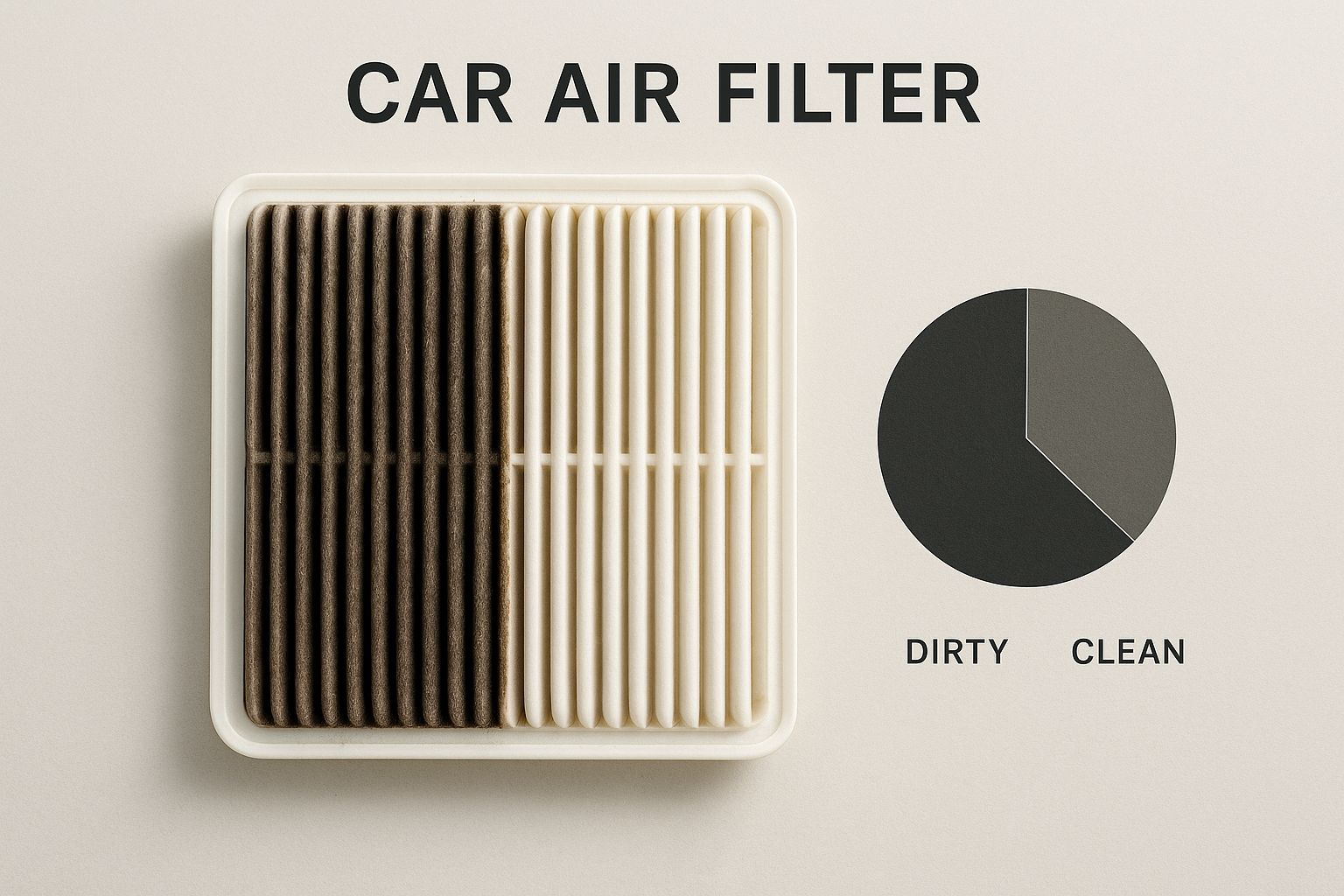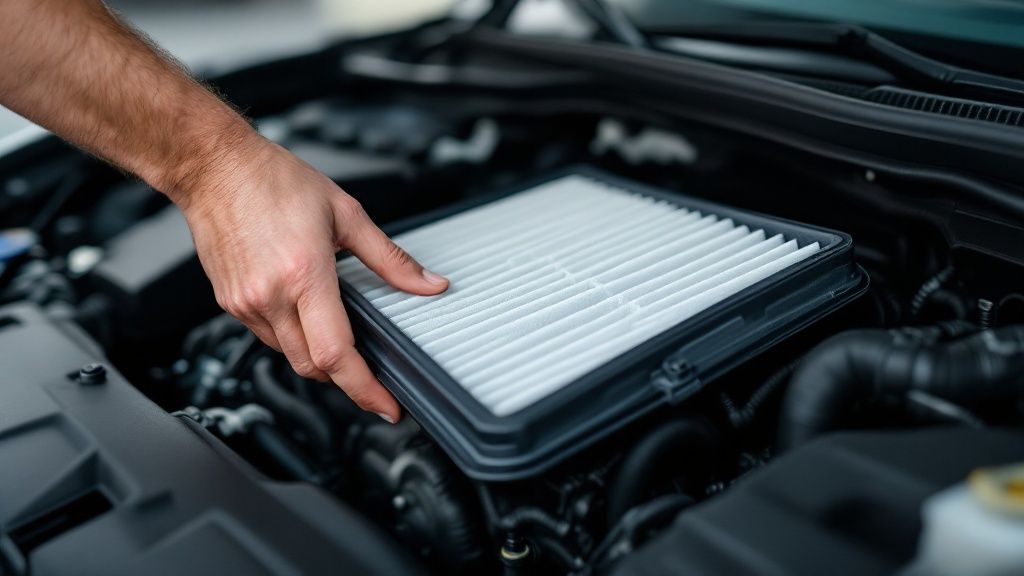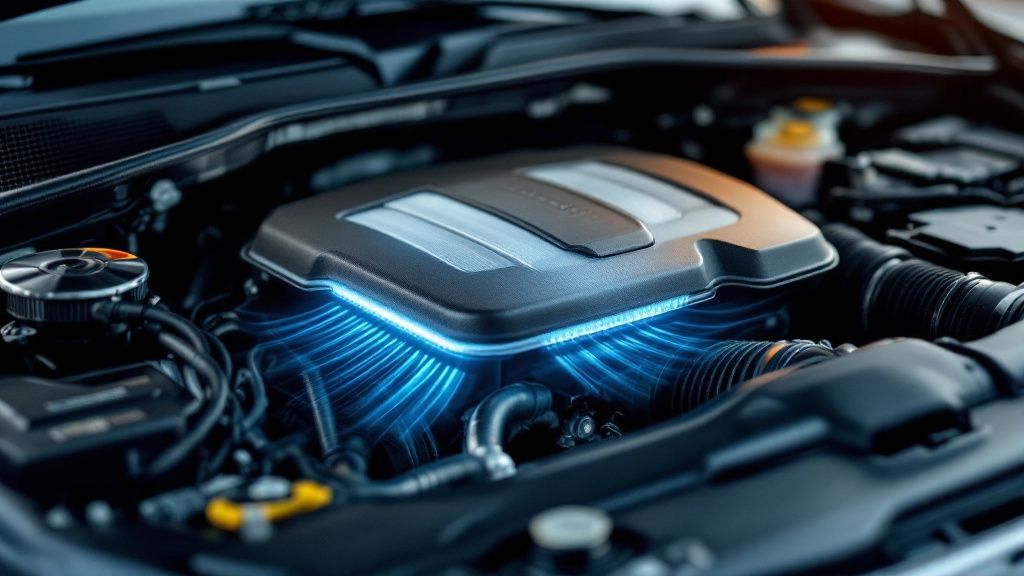Your car uses two essential air filters: the engine air filter and the cabin air filter. Knowing the difference between them is fundamental to proper car care. The engine air filter protects your engine by preventing dust, dirt, and debris from entering. This safeguards critical components and ensures efficient fuel combustion. The cabin air filter, on the other hand, cleans the air you breathe inside the car. It traps pollen, dust, and other pollutants, creating a healthier environment for you and your passengers.
Think of the engine air filter as your car's lungs. It draws in air, removes impurities, and allows clean air to flow through. Just as breathing polluted air harms your lungs, a clogged engine air filter can damage your car. Restricted airflow reduces engine performance and fuel efficiency, potentially leading to expensive repairs. How often should you change it? A general guideline is every 12,000 to 15,000 miles, but this can vary depending on driving conditions and the filter type.
The cabin air filter keeps the air inside your vehicle clean and free of irritants. This is particularly important for those with allergies or respiratory sensitivities. A dirty cabin air filter can restrict airflow from your vents, decrease heating and cooling efficiency, and cause unpleasant odors. It can also worsen allergy symptoms, creating an unhealthy environment inside your car. Replacing your cabin air filter every 15,000 to 25,000 miles, or at least annually, is generally recommended.
The importance of clean air, for both engine performance and passenger well-being, is reflected in the growth of the air filter market. The global automotive air filter market was valued at USD 5.8 billion in 2023. It's projected to grow at a CAGR of 5.5% between 2024 and 2032. Stringent emissions regulations in North America and Europe are fueling demand for high-performance filters. Learn more about this market to understand these trends. These market forces highlight the importance of air filters and the value of regular car maintenance. Making informed choices about your air filters can positively impact your car's performance, your budget, and your health.
The previous section covered the important roles of both engine and cabin air filters. Now, let's focus on the engine air filter and how to determine the right replacement schedule for your specific vehicle. While the general advice suggests changing your engine air filter every 12,000 to 15,000 miles, this isn't a universal rule. Your driving habits and environment significantly influence how quickly your filter becomes clogged.
The 12,000-15,000 mile recommendation assumes "average" driving conditions. But what constitutes "average"? This could range from daily highway commutes to stop-and-go city driving. This difference greatly affects filter lifespan. Highway driving exposes your filter to less dust and debris compared to driving on congested city streets.

This image demonstrates how a dirty air filter restricts airflow. The clean side allows for optimal air intake, crucial for engine performance, while the dirty side clearly shows reduced airflow.
Beyond mileage, several other factors impact your filter's life. Consider your local air quality. If you live in a dusty or polluted area, your filter will clog faster. Seasonal changes, bringing pollen, dust, and leaves, also contribute to filter buildup. Even your driving style – aggressive acceleration or frequent stop-and-go driving – can influence filter longevity.
Maintaining a clean engine air filter is essential for optimal engine performance and fuel efficiency. The typical recommendation is to replace it every 12,000 to 15,000 miles, or annually, whichever comes first. However, driving in dusty or polluted environments may require more frequent checks and replacements. The global engine air filter market, projected to reach USD 5.924.8 million by 2025, underscores the importance of this maintenance. This growth is fueled by increased vehicle production and a heightened awareness of air quality. In regions like North America, with strict emissions regulations from agencies like the EPA, the demand for high-performance air filters is particularly strong. More detailed statistics can be found here: Learn more about air filters.
Your car's owner's manual is your primary resource for specific recommendations for your make and model. Many manufacturers also provide updated maintenance schedules online or through dealerships. Consulting a trusted mechanic can also offer valuable insights. They understand the real-world consequences of neglecting air filter replacement, from reduced fuel efficiency to potential engine damage. Regular maintenance is essential for a vehicle's longevity. For a complete guide, refer to a comprehensive car maintenance checklist. By combining manufacturer recommendations with expert advice, you can develop a personalized replacement schedule to protect your engine.
The table below provides a quick guide for replacing your engine air filter based on driving conditions:
Engine Air Filter Replacement Schedule by Driving Conditions
| Driving Condition | Recommended Replacement Interval | Warning Signs |
|---|---|---|
| Normal Highway Driving | Every 12,000-15,000 miles | Reduced fuel economy, sluggish acceleration |
| City Driving/Stop-and-Go Traffic | Every 7,000-10,000 miles | Decreased engine performance, rough idling |
| Dusty/Polluted Environments | Every 3,000-5,000 miles | Excessive dirt buildup on the filter, black smoke from the exhaust |
| Extreme Conditions (Off-Roading, Construction Zones) | Every 1,000-3,000 miles or after each trip | Visible dust and debris clogging the filter, significant performance reduction |
This table highlights the importance of adapting your replacement schedule based on your driving environment. Regular checks and replacements prevent potential engine problems and maintain optimal vehicle performance.
The previous sections covered the importance of engine air filters and how to determine their ideal replacement intervals. Now, let's talk about the air you and your passengers breathe inside your car—and the crucial role of the cabin air filter.
A properly functioning cabin air filter is your main defense against airborne pollutants inside your vehicle. These filters don't just keep the air smelling fresh; they actively trap a variety of contaminants. Think dust, pollen, mold spores, and even smog particles.
This is particularly important for allergy sufferers, children, and anyone concerned about respiratory health. During allergy season, for example, a clean cabin air filter can significantly reduce the impact of pollen. This makes drives much more comfortable for those with sensitivities.
The common recommendation for cabin air filter replacement is every 15,000 miles. However, just like engine air filters, this advice isn't absolute. Driving conditions, climate, and even where you park can affect how often you should change your filter.
Driving in heavy city traffic or on dusty unpaved roads will clog the filter faster than highway driving. This means drivers in urban areas might need more frequent changes. The cabin air filter's job is maintaining the air quality inside your vehicle. It does this by filtering out dust, pollen, and other contaminants.
Drivers working on construction sites or frequently off-roading may need to replace the filter more often. This is due to increased exposure to dust and debris. The cost of replacing a cabin air filter typically ranges from $30 to $70, depending on the type and brand. Many vehicle owners opt for regular replacements to ensure optimal cabin air quality. Learn more about cabin air filters here.
There are some key signs your cabin air filter needs attention. A decrease in airflow from your vents is a major one. If your car's heating or cooling system seems less effective, a clogged cabin air filter might be to blame.
Persistent bad odors, even after using air fresheners, can indicate a dirty filter. Finally, experiencing increased allergy symptoms while driving could be a direct result of a filter that’s no longer working well.
Some cabin air filters go beyond basic filtration. They incorporate activated carbon or even HEPA (high-efficiency particulate air) filtration. Activated carbon filters absorb odors and gases. HEPA filters trap even smaller particles than standard filters.
These premium filters can improve air quality but cost more. Whether they’re worth the extra expense depends on your individual needs. For drivers with severe allergies or respiratory problems, the added protection might be a worthwhile investment. It comes down to how much you value cleaner air and better respiratory comfort inside your car.
Your car speaks to you, even if it doesn't use words. Knowing how to interpret its subtle signals can save you a lot of trouble and expense. One area where this is especially true is with your air filters. Aside from the mileage recommendations in your owner's manual, there are other, more immediate signs that your engine or cabin air filter might need some attention. Let's explore how to recognize these telltale warnings.
A dirty engine air filter chokes off the air your engine needs for efficient combustion. This can show up in a number of ways. Perhaps the most common symptom is reduced fuel efficiency. You might find yourself filling up more often, watching those hard-earned dollars disappear.
Another sign is sluggish acceleration. Your car might feel less peppy, especially when merging onto the highway or climbing hills. A clogged air filter can also cause rough idling or even misfiring. If your engine shudders excessively or stalls at idle, a dirty air filter could be to blame. Finally, in severe cases, a heavily clogged filter can trigger the check engine light. This definitely warrants a visit to a qualified mechanic, such as those at Kwik Kar.
A struggling cabin air filter also has its own set of symptoms. Reduced airflow from your vents is a key indicator. If your heating and AC systems seem weaker than usual, a clogged cabin air filter could be the culprit. It's essentially blocking the flow of air through your HVAC system.
Another sign is persistent bad odors inside the car, even after using air fresheners. A dirty cabin air filter can become saturated with pollutants, releasing a musty or stale smell into your vehicle. Finally, increased allergy symptoms while driving can also be a telltale sign. If you're experiencing more sneezing, coughing, or watery eyes in your car, a dirty cabin air filter could be making your allergies worse.
Checking your air filters yourself is a quick and easy process. For the engine air filter, locate the air filter housing under the hood. Your owner's manual can help you find it if you’re unsure. A clean engine air filter will typically be white or off-white. A dark gray or black filter, caked with dust and debris, is a clear sign it’s time for a replacement.
The cabin air filter is usually located behind the glove compartment or under the dashboard. Just like the engine air filter, a clean one should be light in color. A dirty cabin air filter will be discolored and might even have visible debris on it.
To help illustrate the difference, take a look at the comparison chart below:
Air Filter Warning Signs Comparison Chart
This table compares symptoms of dirty engine air filters versus cabin air filters to help readers diagnose which filter needs replacement
| Warning Sign | Engine Air Filter | Cabin Air Filter | Severity Level |
|---|---|---|---|
| Reduced Fuel Efficiency | Yes | No | Moderate |
| Sluggish Acceleration | Yes | No | Moderate |
| Rough Idling/Misfiring | Yes | No | Moderate to Severe |
| Check Engine Light | Yes | No | Severe |
| Reduced Airflow from Vents | No | Yes | Moderate |
| Persistent Unpleasant Odors | No | Yes | Moderate |
| Increased Allergy Symptoms | No | Yes | Moderate |
As you can see, different filters manifest different problems. Checking these regularly can prevent more severe car trouble down the line.

This image shows the difference between a clean (left) and dirty (right) air filter. The clogged state of the dirty filter clearly shows how it restricts airflow.
By recognizing these signs and making regular visual checks, you can take care of air filter issues quickly and easily. This not only improves your car's performance and your comfort, but also helps avoid more serious problems down the road.
Now that we understand the importance of air filters and the telltale signs they need replacing, a key question arises: should you tackle the replacement yourself or entrust it to the professionals? This section explores both DIY and professional options, empowering you to make the best decision for your car and your circumstances.
Replacing your car's air filters can be surprisingly simple, potentially saving you money on labor costs. In many vehicles, accessing and replacing both the engine and cabin air filters is straightforward, often involving unclipping a few latches, removing the old filter, and inserting the new one. It can be as easy as changing a lightbulb, only under the hood or behind the glove compartment.

This image illustrates the easy access to the engine air filter in some vehicles. Keep in mind, however, that accessibility isn't always this straightforward.
Not all cars are designed equally. Some models, especially those with more complex engine layouts, can present a real challenge when it comes to accessing air filters. What should be a quick five-minute job can quickly transform into a frustrating hour-long ordeal. Before choosing the DIY route, consult your owner's manual or search online for instructions specific to your car's make and model. This provides a realistic preview of the difficulty level.
For most DIY air filter replacements, a screwdriver is the only tool you'll need. Some vehicles, however, might require specific tools or techniques. Again, your owner’s manual is an invaluable resource for understanding the job's requirements.
The time commitment is generally minimal. A simple engine air filter replacement often takes under 10 minutes. Cabin air filters might require a bit more time, possibly up to 20 minutes, depending on their location.
If you're not comfortable working on your car, or if your vehicle requires specialized tools or procedures, professional replacement is the preferred approach. A qualified technician at a trusted auto shop like Kwik Kar Oil Change and Auto Care can perform the job quickly and efficiently.
When choosing a professional service, seek out shops with certified technicians and a solid reputation for quality work. Don't hesitate to ask about their experience and the types of filters they use. Knowing how often to change your car's air filter is important, but making sure it’s done correctly is equally crucial.
Pricing can vary between shops. While it's wise to stay within your budget, remember that the cheapest option isn't always the best. Quality filters and experienced technicians are worth a reasonable investment. Proper air filter maintenance contributes to better fuel efficiency and can help you avoid more costly repairs in the future.
The choice between a DIY and professional air filter replacement ultimately depends on your comfort level, your car’s design, and your budget. Both options have advantages. DIY can save you money, while professional service provides expert installation. Carefully weigh these factors to make the best decision for your individual needs.
A clean air filter isn't just about routine maintenance. It directly impacts your vehicle's performance, fuel economy, and even the air you breathe. Understanding the benefits of fresh filters helps you make informed decisions about your car's health and your budget.
The engine air filter has a simple job: keep contaminants out of the engine. However, a clean filter makes a significant difference to your car's performance. It allows for optimal airflow, crucial for efficient combustion. This results in several tangible benefits.
Improved Fuel Economy: A dirty filter restricts airflow, forcing the engine to work harder and consume more fuel. Studies show replacing a clogged filter can improve fuel economy by up to 10%. This puts money back in your wallet every time you fill up.
Enhanced Engine Performance: With plenty of clean air, the engine achieves its designed power output. This means better acceleration, smoother running, and improved overall performance. A clean filter lets your engine breathe and perform at its best.
Reduced Emissions: Efficient combustion from a clean air filter minimizes unburnt fuel, directly reducing harmful emissions. This helps the environment and keeps your car compliant with emissions regulations.
The engine air filter keeps your car's mechanics happy. The cabin air filter, however, protects the health and comfort of everyone inside. A fresh cabin air filter improves the air quality inside the vehicle, especially important for people with allergies or respiratory sensitivities.
Improved Air Quality: Cabin air filters trap dust, pollen, and other pollutants, preventing them from circulating inside your vehicle. This creates a cleaner, healthier environment for passengers, especially helpful during allergy season.
Reduced Allergy Symptoms: A clean cabin air filter can significantly reduce allergy symptoms while driving. This makes for a more pleasant experience, without sneezing and watery eyes.
Enhanced HVAC Efficiency: A clogged cabin air filter restricts airflow through your vehicle's heating and cooling (HVAC) system, impacting its effectiveness. A clean filter ensures optimal airflow, maximizing HVAC performance and keeping you comfortable no matter the weather.
Before any maintenance, ensure your vehicle is safely prepared. Think of a drone pre-flight checklist – while not car-related, it highlights the importance of pre-checks for any maintenance task.
Regularly replacing both your engine and cabin air filters is a small investment with big returns. The benefits are clear: better fuel economy, improved engine performance, cleaner air, and enhanced comfort. By understanding these often-overlooked components, you can make smart decisions that benefit both your car and your well-being.
Ready for the Kwik Kar difference? Schedule your appointment today for expert air filter replacement and comprehensive car care at Kwik Kar Oil Change and Auto Care. Our skilled technicians use quality filters to ensure a smooth-running car and a healthy, comfortable ride.


Get upto $20 OFF on all services.